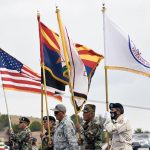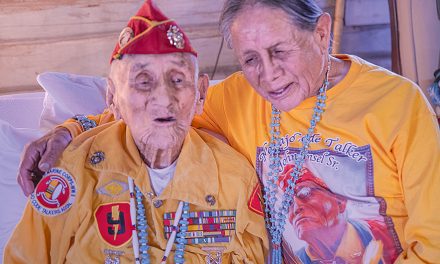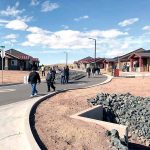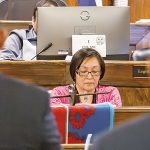
Council blames directors for special duty pay failure
WINDOW ROCK
The Navajo Nation Council’s war on division directors and program managers continues, especially when it comes to special duty pay.
During the Dec. 10 Naabik’iyati’ Committee meeting, Controller Pearline Kirk gave a presentation on special duty pay, or hazard pay, for employees who have worked during the pandemic.
When the Navajo government shut down in March, it paid out $37.4 million in administrative leave. It allowed for employees who worked during the pandemic to be paid a hazard bonus either in a lump sum, which was intended for salary based employees, or time-and-a-half for employees who are paid hourly. Lump sum payments totaled $2.2 million, and hourly employees were paid a total of $7.4 million extra.
“Nine point six million dollars has been paid out as incremental/special duty pay for the period of March 13 to November 20,” said Kirk. “Keep in mind government closure was from March 13 to August 16.”
Special duty pay was also drawn from sources other than CARES Act funding, such as PL 93-638 funds, general funds, and other external funds, she said. In July, a Council resolution (No. CJN-46-20) was signed into law to set up the special duty pay business unit, but it took eight weeks to actually set up. “Even though the government opened back up on August 17, we were still getting a lot of documents,” said Kirk. “Our office was aware, because we got inquiries from employees asking where their special duty was. But we never got documents.”
The controller’s office set an internal Oct. 26 deadline in order to address the documents with programs, Department of Personnel Management or Office of Management and Budget.
As a public service, the Navajo Times is making all coverage of the coronavirus pandemic fully available on its website. Please support the Times by subscribing.
How to protect yourself and others.
Why masks work. Which masks are best.
Resources for coronavirus assistance
She showed a picture to Council of boxes of special duty pay documents that had come to her office on Oct. 26, and they worked overtime to process what they could. “I do believe we have constituents probably asking why they didn’t get paid,” said Kirk. “Employees will ask us of certain things, but yet we don’t have documents at our office. “I will say we have a systemic problem before the pandemic,” she said, “during the pandemic it’s further highlighted when our programs, division, everybody doesn’t follow these payroll deadlines.”
Health, Education, and Human Services Committee Vice Chair Carl Slater said it was sad that employees were let down by management. “I have a constituent who hasn’t been paid since the middle of October,” said Slater.
“After they got COVID … the amount of stress and trauma and amount of unnecessary errors has repercussions.
“Programs can talk our ears off on how they did this early and that early,” he said, “but when you go back to look at who signed what and … you see those program managers’ and division directors’ signatures on documents very, very late.”
Law and Order Committee Chair Eugenia Charles Newton said, “Council is carrying the load” because they are making a lot of the decisions. She asked Kirk how many of the division directors received special duty pay. “Our constituents are holding us accountable,” said Newton. “There has been a lot of comments about social media and that to me is a way to keep us accountable. This all comes down to poor management.
“I always think of the Titanic when the captain went down with the ship,” she said. “I question if directors were paid, how are the employees not paid?”
Law and Order Committee Vice Chair Otto Tso said that Kirk “alluded” that last-minute documents for special duty pay were the fault of division directors and managers, and asked if her office could put that on a spreadsheet for Council. “Put it on a spreadsheet how long it took these division directors and managers to sign off on certain documents,” said Tso. “When do we start holding managers and division directors responsible for these things? You are painting a picture that our managers and division directors aren’t on the ball.”
Although Kirk did not say how much directors got, an Oct. 22 memo obtained by the Navajo Times from the speaker’s office to the controller’s office requested special duty pay for the essential office personnel who have been a “vital asset” to the speaker’s office, the Navajo Nation Council and the 110 LGA and non-LGA-certified chapters during COVID.
“Due to the COVID-19 pandemic, staff members were required to work demanding hours and be on call in order to fulfill office duties, responsibilities, and obligations,” stated the memo. “Staff have worked in the office, remotely, and in the field to assist and provide services to the Council delegates, legislative branch, program directors and other constituents in the service to the Navajo Nation.”
Five office staffers of the speaker’s office received $7,500 each for lump-sum special duty pay, another five office staffers received $5,000 each, and one office staff member received $10,000. Kirk said when it comes to finger pointing and blame, it’s usually directed at her office even though programs and offices had time to submit paperwork.
She also noted that Navajo Police is a success story when It comes to getting employees paid special duty pay, because her staff walked the whole process through with the chief of police, sergeants and commanders. “To me those are some success stories that no one hears about,” said Kirk. “You only hear about the complaints. If management is wanting to pay their people, it can happen.”
Throughout the various committee meetings, delegates haven’t shied away from pointing out the failures of the directors and managers. During Monday’s Law and Order Committee meeting, when discussing law enforcement for Navajos who live on Hopi Partitioned Land, delegates decided a community review should happen on directors and managers because they saw them as failing the communities.
But President Jonathan Nez explained a couple days before, during his Dec. 8 virtual town hall, that $21 million of the $714 million in CARES funding was placed aside for special duty pay, and he listed that it was intended for those on the front lines like police officers, community health representatives, senior center staff and chapter staff.
He also gave a breakdown of resolutions that were signed into law, and where the funds were allocated. “Twenty-one million was allocated to special duty pay… $2.1 million was spent,” explained Nez in the town hall, which was two days before Naabikytai. “Eighteen point eight million is still remaining in that line item. Only 10 percent was spent … 90 percent is remaining. That 90 percent should go back to the hardship amount.”
Nez commended his directors, noting that over 70% of the CARES Act projects undertaken by the executive branch, from dollars allocated to the branch, have been completed. But a lot of the strife comes from division directors and managers being summoned to present to the committees.
Because they have been working on the projects and other CARES matters they don’t have much time to spare, and Nez made it point to tell directors to send their staff to the committee meetings instead.
“The Council wanted these projects to be completed with the CARES Act fund,” said Nez. “We all needed the division directors, staff to focus on CARES projects. We don’t have time to be doing reports every day to every committee.
“At the end of the day if we don’t finish these projects, we are thrown under the bus,” he said. “Division Directors did an outstanding job with the short time they had.”








 Highway 264,
Highway 264, I-40, WB @ Winslow
I-40, WB @ Winslow